Contents
- Compulsory school attendance and the structure of basic education
- Elementary school admission process
- School year
- Grading in Czech schools
- A day at a Czech school
- Types of elementary schools
- Information for refugees
Compulsory school attendance and the structure of basic education
It is compulsory for children to attend elementary schools and thus they are legally entitled to free primary education. Compulsory schooling in the Czech Republic lasts a total of 10 years, and it begins with at least one year spent in a kindergarten.
Are you interested in how things work in Czech kindergartens?
Read our next article.
After kindergarten, children are enrolled to an elementary school, which is divided into two stages. The primary stage, i.e., the first stage, lasts from the first to the fifth year of study. For the following four years, children study at the second (lower secondary) stage. Some children stay in an elementary school for the entirety of 9 years, but others can transfer to multi-year gymnasiums or conservatories in the 6th or 8th grade after passing the entrance exams.
Compulsory school attendance usually concerns children between the ages of 5 and 15, but there are some exceptions. For example, if a pupil is above-average gifted, they can take a differential exam and transfer to a higher grade earlier than their classmates. However, such transfers occur only rarely and can even negatively impact the gifted children by isolating them from their former friends or disrupting the graduality of the learning system.
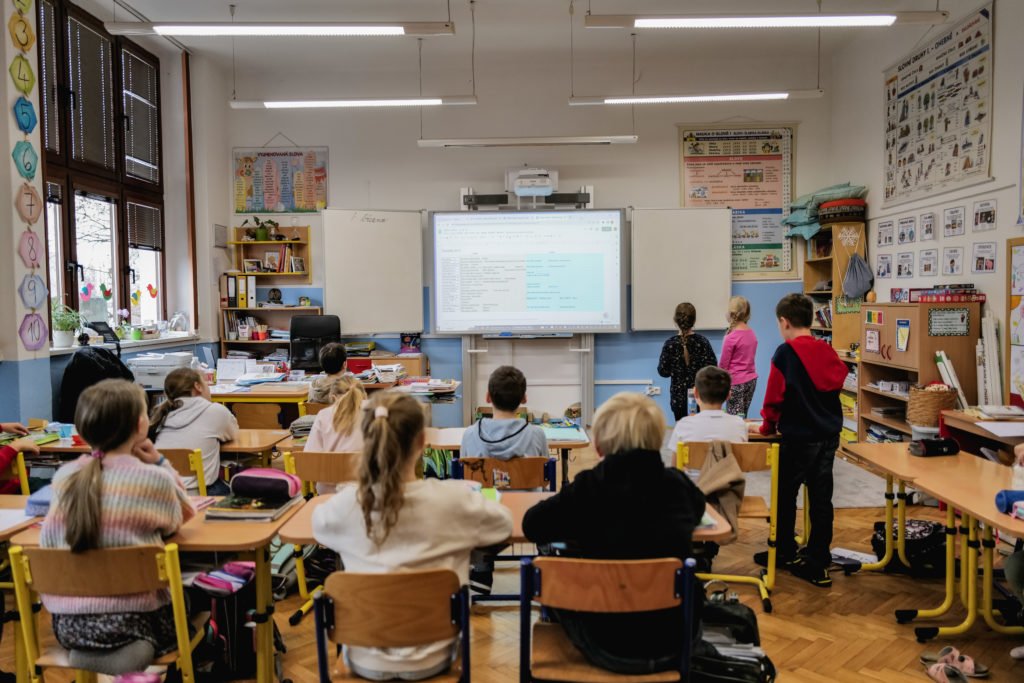
On the other hand, some children may struggle to keep up with school and therefore have to repeat a grade. However, elementary schools can only educate children until they reach the age of majority. If a pupil turns 18 before entering the ninth grade, they must leave school without completing elementary education.
When pupils successfully complete primary school, they can continue to secondary schools, gymnasiums, conservatories, or secondary vocational schools.
Elementary school admission process
Children who are mentally and physically mature, and who will be at least 6 years old on September 1st of the given school year, can be enrolled to elementary school. To know how well-prepared the applicants are, schools test their skills with an admission exam. During this process, children usually have a short talk with the admissions committee, they recite a poem, sing a song, draw, or color pictures.
What should children be able to do before entering primary school?
– Know their name and the names of their parents
– Lead a simple conversation
– Pronounce individual sounds correctly
– Focus on the task at hand
– Dress and put on shoes independently
– Cut with scissors and draw simple pictures
– Know basic colors and shapes
However, if your child does not pass the exam on their first attempt, do not worry – they will not lose the opportunity to study. If the child is not yet sufficiently prepared for primary school, they can continue to attend kindergarten or enroll into a preparatory class, where they will learn the necessary skills. After the admission exams, parents can also file an official request for a postponement of enrollment, but their request needs to be approved by the school director, the child’s doctor, and the school counseling office.
This year’s admission exams will take place in April for Czech children, and between June 1 and July 15 for Ukrainian children. It can be expected that the conditions of admission will probably be milder for Ukrainian refugees, but it is not yet entirely certain to what extent.
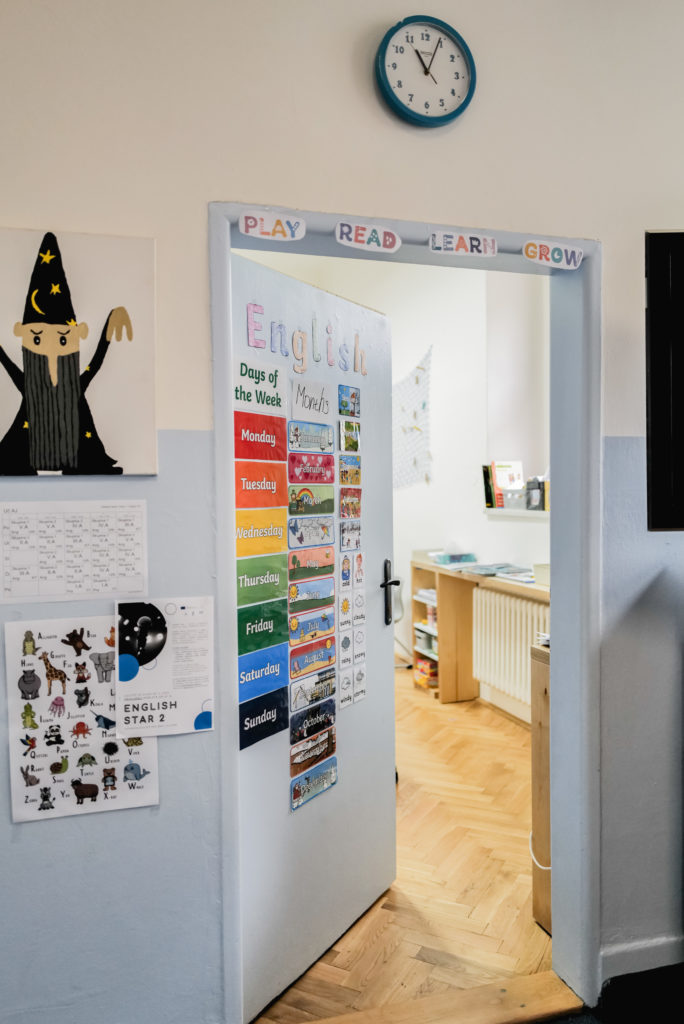
School year
The school year lasts from the beginning of September to the end of June and is divided into two five-month semesters. It is followed by holidays that last from July to August. In addition, children also have shorter holidays throughout the year, the dates of which often differ in individual regions. Like most parents, children also have time off during public holidays.
Holidays
Autumn holidays – end of October
Christmas holidays – approximately December 23rd – January 2nd
Mid-term holidays – one day at the end of January or the beginning of February
Spring break – a week in February or March
Easter holidays – from Maundy Thursday to Easter Monday
Public HolidaysCzech Statehood Day
28.9.
Czechoslovak Independence Day
28.10.
Struggle for Freedom and Democracy Day
17.11.
Labor Day
1.5.
Victory Day
8.5.
Find out what other public holidays are celebrated in the Czech Republic.
Grading in Czech schools
In most schools, children are given marks from 1 to 5, with 1 being the best mark and 5 the worst. All marks also have verbal equivalents, which are used mainly in the second stage of elementary education. Some schools do not use classic marks and they evaluate children in a different way – for example with verbal evaluation in which teachers describe how did the student do.
Verbal equivalents of marks
1 – výborně (excellent)
2 – chvalitebně (commendable)
3 – dobře (good)
4 – dostatečně (sufficient)
5 – nedostatečně (insufficient)
Children get marks not only for tests, but also group activities, homework, presentations, or class work. At the end of each semester, they also receive a report card in which they are evaluated with an overall grade for each subject. This grade can be the average of the marks obtained during the given semester, but it is often also a reflection of the student’s behavior or effort.
What to do if your child gets a 5 on their report card? After receiving the report card, you can appeal against the grade within three workdays. After that, the grading is immutable. In the first semester, getting a 5 is “merely” a warning signal for children and parents, but in the second semester, it means that the student must take a make-up exam.
If they don’t succeed in this exam, they have to repeat the grade. This is, however, only possible once in the first stage and once in the second stage of elementary education. After that, pupils will proceed to a higher grade even if they are graded with a 5 and they need to try to catch up with their peers.
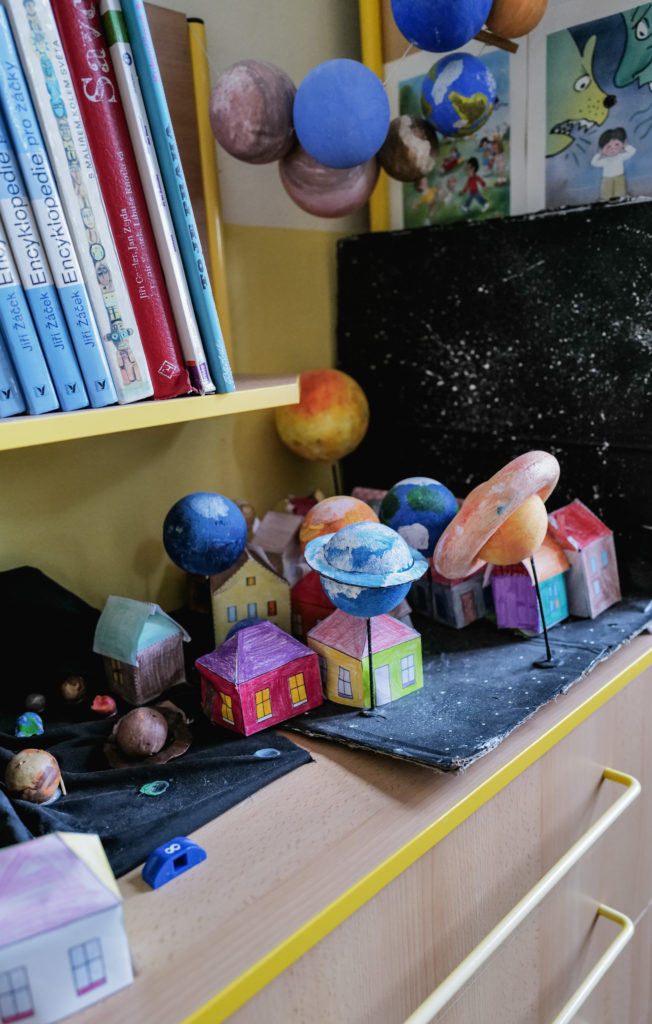

Parents often find out about their children’s marks through the school’s internet portals, or through grade books, i.e., small notebooks in which teachers can write down their notes and the pupils’ marks.
Parents will also receive a brief summary of grades at parents’ evenings. These are held several times a year, and parents can meet their children’s class teacher there. In addition to teaching the pupils, the class teacher also knows the children more personally and watches their behavior and attendance. During parents’ evenings, parents can also visit individual teachers to discuss the given classes or individual problems of their children. Most schools also allow parents to arrange consultations with teachers outside of parents’ evenings.
A day at a Czech school
As children go to school between the ages of 6 and 15, their usual daily routine varies significantly in the different stages of their studies.
Pupils attend school from Monday to Friday and participate in classes according to a predetermined schedule. Lessons usually last 45 minutes and are interleaved with breaks of 5–20 minutes. Classes typically start at 8:00 a.m. and can last until late in the afternoon. In the first stage of their education, however, children might finish their classes quite early, often around noon.
Children learn different subjects at school, but their complete list may vary from institution to institution. Here are some of the disciplines that your children may encounter in elementary school.
Czech language
Children learn to read, write, and they study grammar and literature.
Foreign language
Foreign language classes usually start in the third grade or even earlier, most often with English. At the second stage of elementary education, a second foreign language is added.
Mathematics
Children learn to count and solve mathematical and logical problems.
Information Technology
Children are introduced to technology and learn how to use a computer.
Humans and their world
First graders learn basic information about society and nature here.
Natural science / natural history / biology
The subject deepens children’s knowledge about nature, animals, and the human body.
Homeland history and geography
First-stage pupils learn the basics of geography and history of the Czech Republic.
Music class
Children learn to sing, understand music, and play simple instruments.
Art class
Children learn to interpret and create works of art.
Physical Education
Children try different sports and develop their movement skills.
Practical activity lessons
The subject gives children practical life skills, from cooking to simple housework.
History
Children study Czech and world history.
Civic education / Social sciences
Pupils get an overview of social and human sciences.
Physics
The subject helps children understand the laws of natural phenomena.
Chemistry
Pupils learn to understand elements, their composition and behavior.
Geography
Children develop their knowledge of the world, the Czech Republic, but also space and nature.
Elementary schools can also offer additional subjects beyond those described above, for example other languages, financial literacy classes, or media education. Individual subjects are taught by pedagogues with a specific focus, but the youngest pupils are usually taught solely by their class teacher.
Teaching materials, such as textbooks, are usually lent to first-stage students by the school. Parents, however, need to buy additional school supplies for their children, such as notebooks, art supplies, pencil cases, and more. The list of needed supplies is provided by the school or individual teachers.
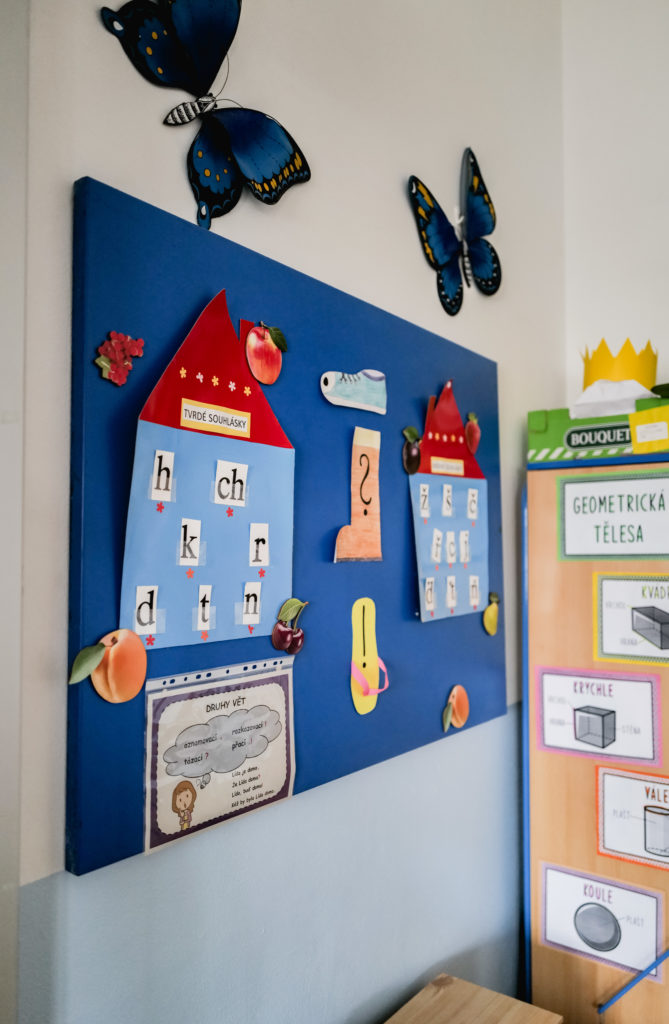
After class, children go for a lunch. Many schools have canteens on their premises or in the immediate vicinity, where children and teachers eat. Parents have to pay for the children’s food in advance, but compared to restaurants or home cooking, the prices at canteens are normally much lower. At some schools, you will also find buffets or bistros where children can buy healthy snacks. Lunch is sometimes followed by more classes, often called “odpoledka” by the pupils.
Many children stay in school even after their classes end. Parents of younger pupils can enroll their children in after-school care, which is usually financially affordable and enables kids to play and do fun activities under supervision. Second stage pupils often spend time in the school club, if their school provides this option. In addition, schools often organize various extracurricular activities and circles, where children can develop specific skills.
Looking for fun leisure time activities for your child?
We have a few tips.
Types of elementary schools
Each child has a so-called “catchment school”, which is determined by their place of residence. This institution must enable children from the relevant catchment area to obtain elementary education. If its capacities are not filled, the school can also accept children from more distant areas. In the Czech Republic, you can find several types of primary schools. Here are some of them.
Public elementary schools
This is the school that we mostly speak of in this article. State elementary schools are the most common and most visited in the Czech Republic. They are managed by municipalities, just like kindergartens, and children are legally entitled to visit them for free. Public elementary schools also include small schools with composite classes (“malotřídky”) which are common mainly in smaller towns and villages. In these small schools, children of different ages attend one class together, in which they learn the curriculum of the first stage in groups. The pupils then continue to finish their elementary education on other schools.
Alternative elementary schools
Alternative schools include a wide range of institutions, including Scio schools, Waldorf, Dalton, Montessori schools and others. While these institutions may differ from each other, they are often oriented towards the project-based concept of teaching, they have a more individual approach to pupils, and they promote unusual class arrangements and grading systems. Foreign language or bilingual primary schools also belong to this category. These institutions educate children in foreign languages from an early age, mostly across different subjects. Alternative schools in the Czech Republic are private, but they must be approved by the Ministry of Education, Youth and Sports. In comparison with foreign countries, significantly fewer children attend alternative elementary schools in the Czech Republic.
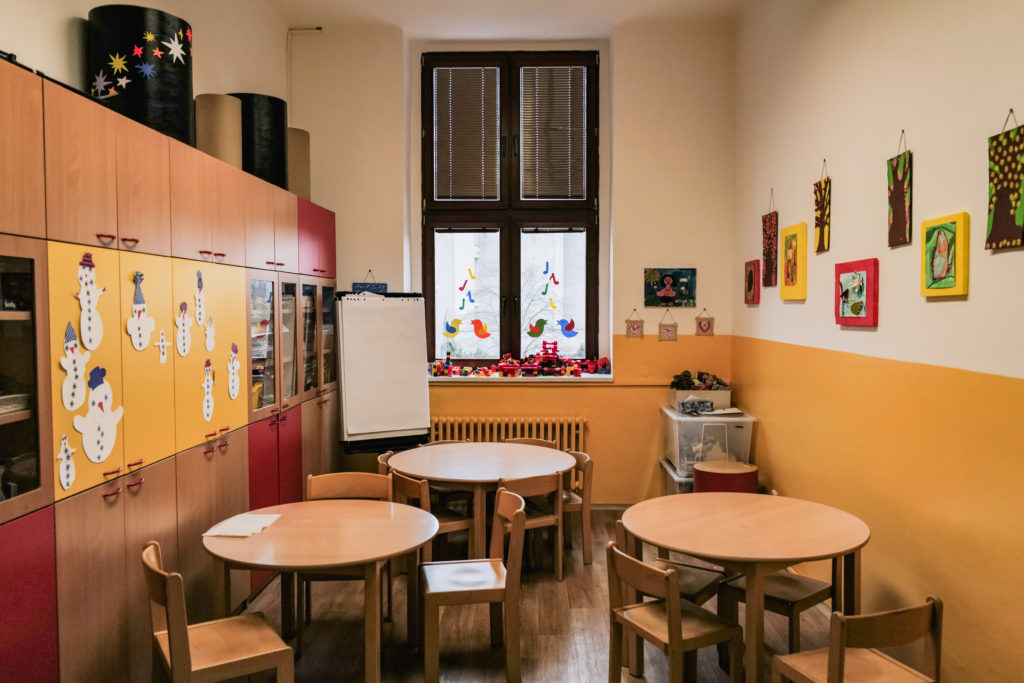
Home education
Parents may also educate their child at home – partially, or completely. This method of teaching became popular mainly during the pandemic. Parents must apply for home education to the headmaster of their catchment or selected school and obtain confirmation from the pedagogical-psychological counseling center. However, only selected institutions allow home education. If parents or legal representatives want to educate the child, they must have at least a high school diploma, or, in the case of a second stage education, they must have a university degree. The given elementary school has the obligation to check the pupil regularly and inform the headmaster of the school on whether home education appears to be sufficient. If not, the child must start attending school and participate in regular classroom activities.
Special schools
Special elementary schools are intended for pupils with severe mental, physical, hearing, or visual handicaps and serious learning disabilities or speech defects. They differ from ordinary elementary schools in form and content of education. Whether the pupil is a suitable candidate for this type of school or not is primarily determined by a doctor, pedagogical-psychological counseling center, and the pupil’s legal representative. Special schools are mainly attended by children who are having trouble catching up on regular elementary school curriculum, and the help of a teacher’s assistant and other support measures has been proved ineffective in their case.
Information for refugees
Children who are not Czech also have the legal right to obtain elementary education.
18,743 – This is how many Ukrainian children enrolled into Czech primary schools in 2022.
51,220 – This is how many Ukrainian primary school pupils are now registered in the Czech Republic.
Source: Seznam Zpravy , 2022.
Children of refugees should start attending elementary school within 90 days after being granted the temporary protection. When it comes to children from Ukraine, an unexcused absence lasting 15 days or more is grounds for removing the pupil from the school record.
Unfortunately, schools do not have precise instructions on how to work with Ukrainian children at the moment. The situation may thus be different at each institution. Some schools have established a separate class for Ukrainian children, but in most cases, the goal is to integrate foreign pupils into regular classes as soon as possible. Some institutions have adaptation groups, which enable Ukrainian pupils to prepare for elementary school and learn Czech. Most primary schools also offer a special subject called “Czech for foreigners.”
Schools are now recommended to put new Ukrainian pupils in a class according to their age and solve any deficiencies in knowledge individually with children and their parents. However, due to the upcoming secondary school exams, students aged 14-15 should be ideally placed into a lower class to have time to catch up with the rest of the students. For newly enrolled Ukrainian pupils, schools should also temporarily replace regular marks with verbal evaluation, in which, apart from the overall results from tests or assignments, teachers should take into account the pupils’ personal progress and diligence.
There are several useful websites that may help Ukrainian parents find a suitable school in the Czech Republic. For instance, Shkola.cz provides parents with an overview of vacancies in Czech schools and assists them in communicating with the individual institutions.
Parents can also request free interpreter services for consultations with schools. These are mostly ensured by the schools themselves in cooperation with the National Pedagogical Institute. There are also specialized interpreters for deaf refugees.
Ukrainian parents living in Prague can also get help at the Center for Follow-up Assistance to Refugees from Ukraine (CNPUU) in Vysočany. The center specializes in helping refugees who already have the necessary documents and are now solving problems regarding housing, medical care, or schooling for their child.
Are you looking for more useful links which concern Czech education and other areas? Take a look at our guidebook.
